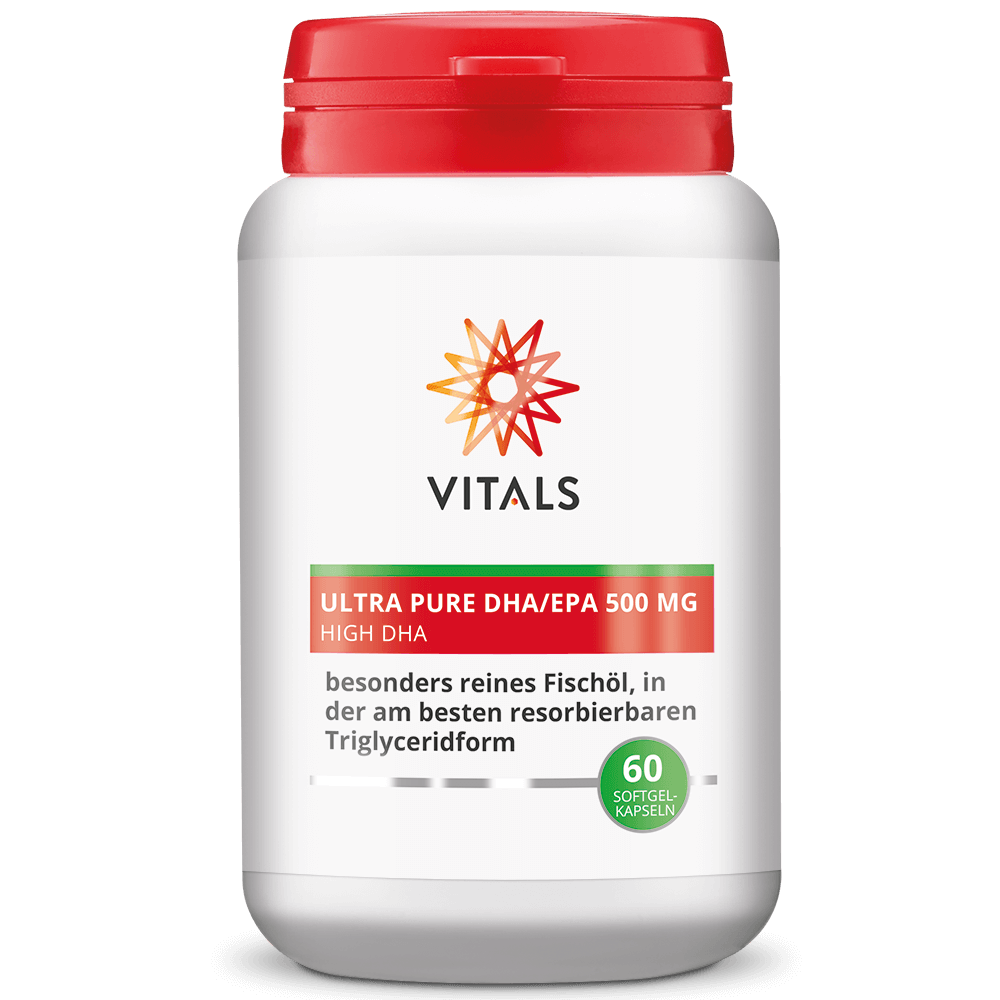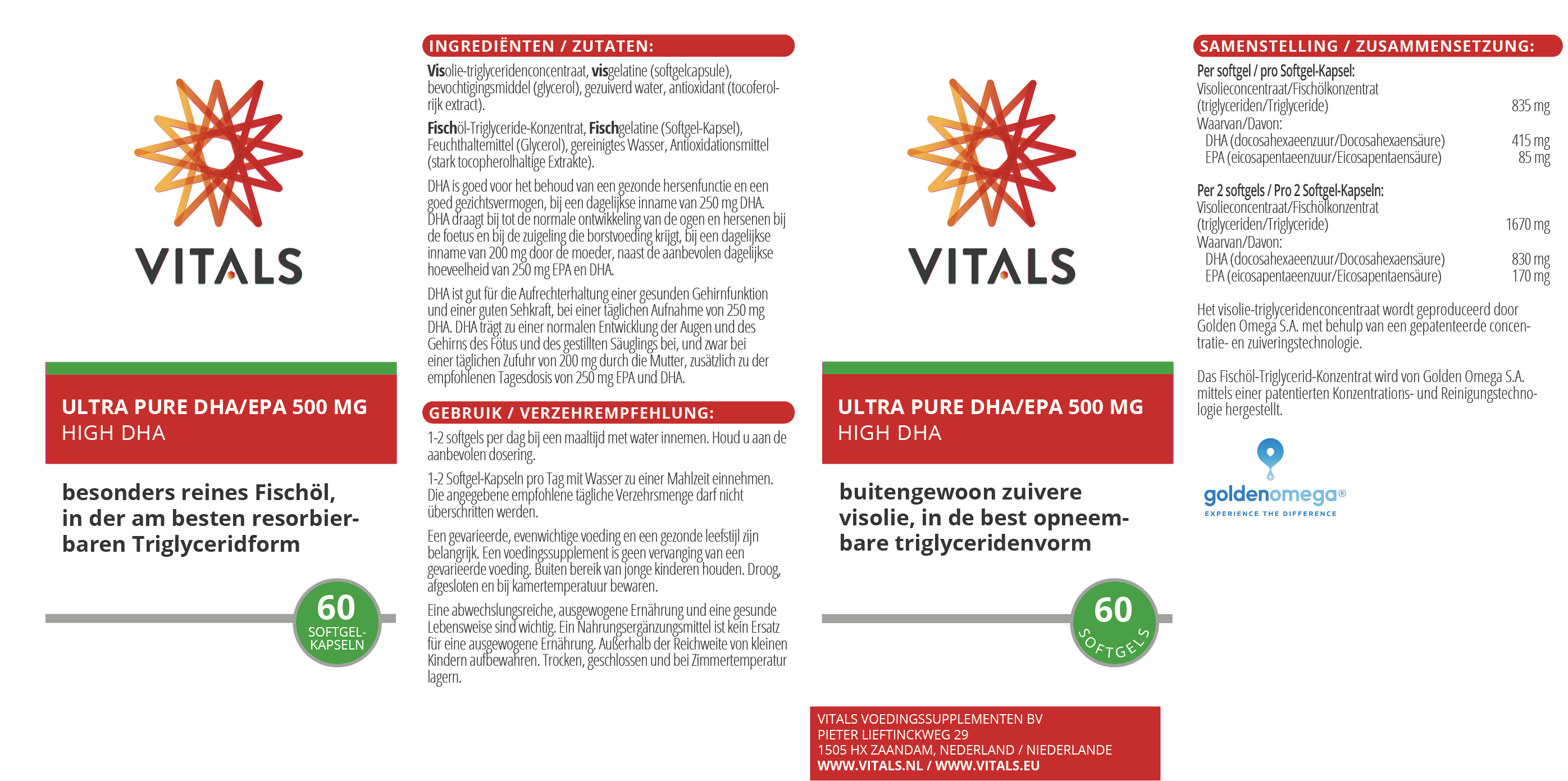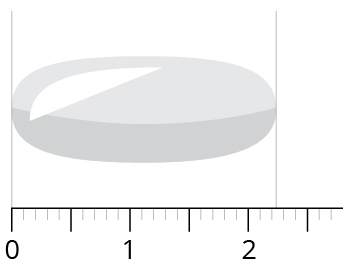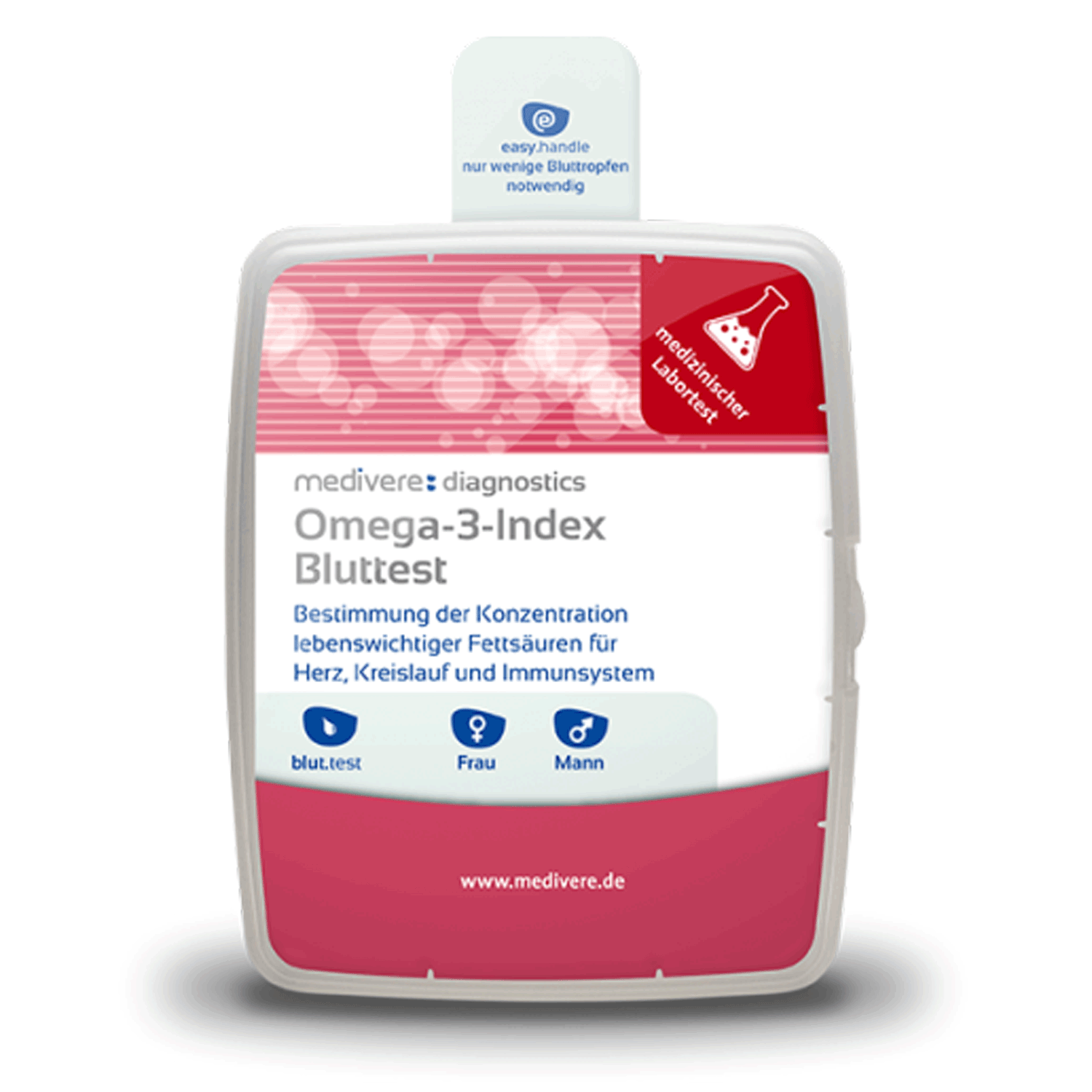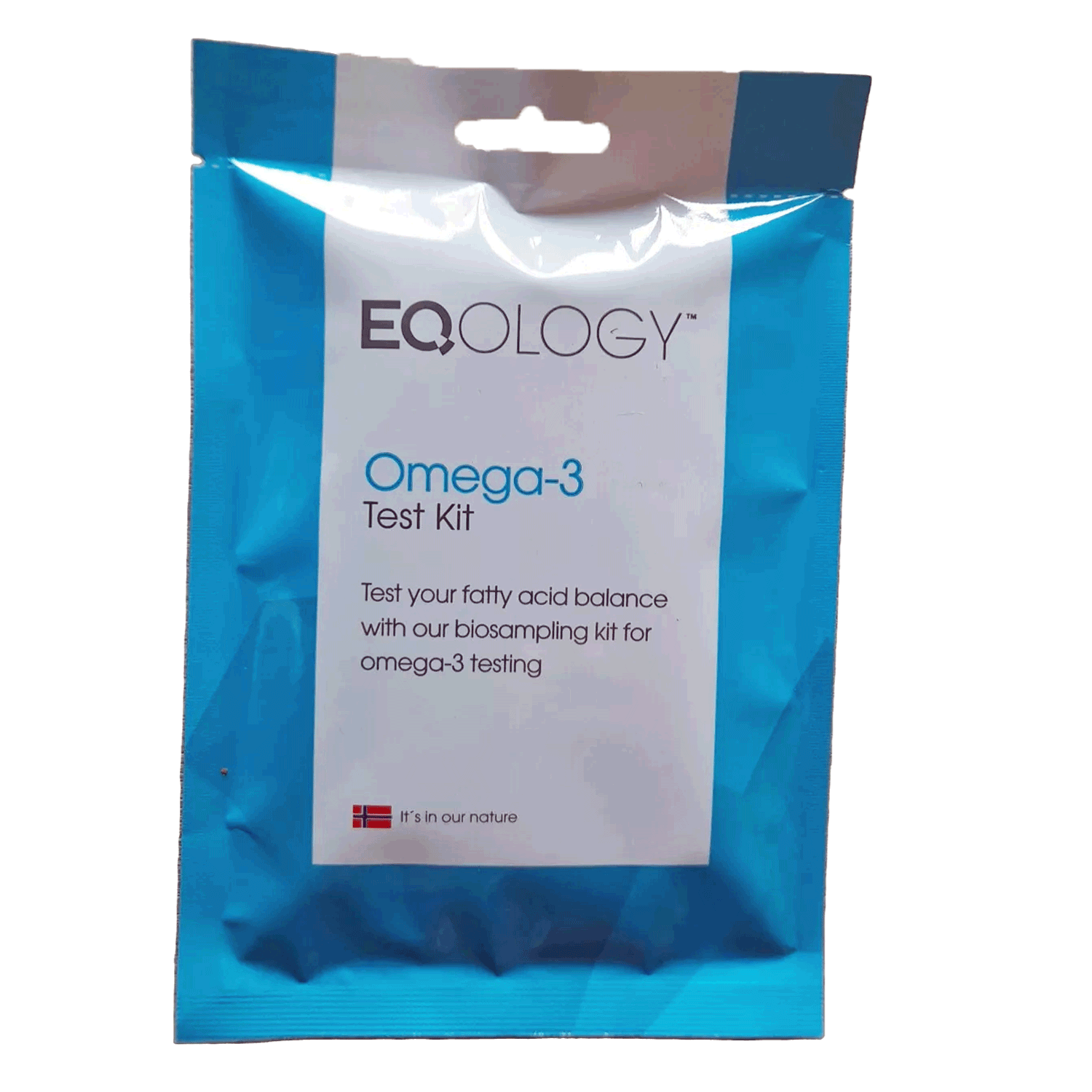- 85 mg EPA and 415 mg DHA per capsule
- Very fresh fish oil in the highly absorbable triglyceride form
| Quantity | Unit price | Base price |
|---|---|---|
| To 1 |
€24.90*
|
€350.70* / 1 Kilogramm |
| To 4 |
€23.70*
|
€333.80* / 1 Kilogramm |
| From 5 |
€22.40*
|
€315.49* / 1 Kilogramm |
Available in 3 days, delivery time 1-3 days
Ultra Pure EPA/DHA 500 mg from Vitals
For pregnant women, people who are breastfeeding and adults over 50 years of age
As the human organism can only synthesise a small amount of DHA from the omega-3 fatty acid alpha-linolenic acid (ALA), an adequate dietary intake of DHA is important for normal eye and brain development in foetuses and infants and for the maintenance of normal vision and healthy brain function in adults. The supply of DHA to the foetus during pregnancy depends on the mother's intake. The infant receives DHA through breastfeeding (so it depends on the mother's consumption) or through infant milk, to which DHA must nowadays be added. From the age of 50, many people feel the urge to take special care to maintain their normal brain function and eyesight. It is also important at this stage of life to ensure a sufficient daily intake of DHA through regular fish consumption and, if necessary, to supplement this with a fish oil or algae oil supplement with a high DHA content.
It is no coincidence that the consumption of highly fatty fish species, which are naturally high in DHA (and EPA), has always been included in official dietary recommendations for all age groups as part of a healthy diet. In practice, however, most people do not consume enough (oily) fish to reach the recommended daily intake of DHA and EPA. There are various reasons why these people do not reach the recommended daily intake. This can be problematic as fish is still our main source of EPA and DHA. In 2010, the EFSA (European Food Safety Authority) issued an additional recommendation for pregnant and breastfeeding women aimed at a daily intake of 450 mg DHA and EPA (of which at least 200 mg DHA). A pregnant or breastfeeding woman who structurally eats fish twice a week (including oily fish at least once) achieves approximately this amount. However, many women who are pregnant or breastfeeding do not reach this amount. In addition, recent research studies suggest that the optimal dose of DHA and EPA during pregnancy (and breastfeeding) may be higher. However, pregnant women should not consume fish more than twice a week as it may contain contaminants (particularly dioxins, polychlorinated biphenyls (PCBs) and heavy metals such as methylmercury) due to environmental pollution.
As some fish species have higher concentrations of contaminants than others, expectant mothers have a limited choice. This is not a problem with high-quality, purified fish oil preparations that contain only small amounts or none of these contaminants. For pregnant and breastfeeding women who do not regularly eat fish twice a week or wish to further increase their DHA intake, it may be advisable to supplement their diet with a daily fish oil supplement.
Fish oil from Golden Omega
is part of the Ultra Pure EPA/DHA 700 mg. The company is located in the far north of Chile in a state-of-the-art factory. The building is very strategically located, right next to the waters where the fish are caught for fish oil production. A significant advantage of this is that the fish can be processed quickly after being caught and therefore remains very fresh. To minimise the impact on the environment, Golden Omega works exclusively with certified fishermen.
Golden Omega focuses on purity and quality in the production of its fish oil. The use of a patented purification process to remove impurities from the fish and an equally patented concentration process ensures that Golden Omega offers a product of the highest quality. This is reflected in the bright colour of the fish oils, but above all in the extremely low TOTOX values of their oils (the average value of which is less than 5). The TOTOX value ("TOTal OXidation value") serves as an indicator of the freshness or rancidity of an oil. Fish oil is particularly susceptible to oxidation because it contains many sensitive unsaturated fatty acids. Fatty acids suffer oxidative damage when they come into contact with oxygen; this can be exacerbated by heating (such as when frying fish). As rancid oils are considered unhealthy, a low TOTOX value is important. In addition to purity, it is also an excellent indicator of the quality of a fish oil preparation. In addition, a low TOTOX value reduces the likelihood of fishy burping. And that is a great advantage for many people.
Golden Omega holds several quality and sustainability certificates that prove the high standard of its fish oils. These include IFOS (seal of approval for the quality, freshness, purity and stability of fish oil), Friend of the Sea (seal of approval for sustainable fishing and protection of the natural ecosystem), Dolphin Safe (seal of approval for sustainable fishing and dolphin protection) and Green-e (seal of approval for green energy).
The difference between fish oil as a triglyceride and ethyl ester
There are different types of fish oil supplements on the market. There are food supplements with omega-3 fatty acids in the natural triglyceride form (such as liquid fish oil, e.g. Liquid EPA/DHA 1200 mg) and in the re-esterified triglyceride form. Products containing EPA and DHA in the ethyl ester form are also available.
Food and fish oil contain fats in the form of triglycerides. They are made up of three fatty acid molecules bound to a single glycerol molecule (see Figure 1). Unprocessed fish oil contains two other fatty acids in addition to EPA or DHA. In this way, the natural EPA/DHA content in fish oil is a maximum of 30 %. Because the space in a softgel capsule is limited, higher concentrations of up to 80-90 % are desirable in fish oil preparations in such capsules. During the manufacturing process, the fatty acid chains are separated from the glycerol and the EPA/DHA fatty acids are isolated by extraction. Because these free fatty acids are very unstable, they are then bound separately to an ethanol molecule. These compounds are called ethyl esters. This method is used in many food supplements containing fish oil. During the production of the fish oil for Golden Omega Ultra Pure EPA/DHA 1000 mg, the EPA/DHA fatty acids are reattached to a glycerol chain (re-esterified). This creates a triglyceride (also called rTG, which means "re-esterified triglyceride"). In this way it is similar to the structure of natural fatty acids, but with three EPA/DHA side chains instead of just one.
EPA/DHA as triglycerides, which are more easily absorbed than ethyl esters In the body, fats (triglycerides) are broken down into monoglycerides and free fatty acids so that they can be absorbed by the intestinal cells. They are then recombined to form triglycerides. Fatty acids are absorbed as triglycerides via the lymphatic system and enter the bloodstream. Ethyl esters have the disadvantage that they require another enzyme to break them down into free fatty acids. In order for the fat-splitting enzymes to do their job properly, they also need triglycerides from food. Several studies have shown that the absorption of omega-3 fatty acids in the form of triglycerides is more favourable. If the omega-3 supplement is consumed with a low-fat meal (such as an average breakfast or lunch), this difference is even more pronounced. The absorption of omega-3 fatty acids in triglyceride form is also more effective with a high-fat meal than with a low-fat meal or on an empty stomach.
Authorised health claims:
- DHA is good for maintaining healthy brain function and good vision with a daily intake of 250 mg of DHA.
- DHA is an important building block for the brain with a daily intake of 250 mg DHA.
- DHA plays a role in the function of the retina with a daily intake of 250 mg DHA.
- DHA contributes to normal eye and brain development in foetuses and infants who are breastfed if the mother takes 200 mg daily in addition to the recommended daily dose of 250 mg EPA and DHA.
- EPA and DHA contribute to normal heart function with a daily intake of 250 mg EPA and DHA.
Valuable ingredients
| Valuable substances* | per daily portion of 1 capsule |
| Fish oil concentrate (as triglycerides) | 835 mg |
| - of which EPA (eicosapentaenoic acid) | 85 mg |
| - of which DHA (docosahexaenoic acid) | 415 mg |
* No reference quantity according to LMIV specified
Ingredients
Fish oil triglyceride concentrate, fish gelatine(softgel capsule), humectant (glycerol), purified water, antioxidant (extracts containing strong tocopherols).
Recommended dosage
Take 1-2 softgels daily with a fat-containing meal and water. For pregnant women 1 or 2 softgels per day, depending on diet and omega-3 status. Breastfeeding women and adults aged 50 and over: 2 softgels per day.
Storage instructions
Store in a cool, dry place away from light (not in the refrigerator).
Legal information
The recommended daily intake must not be exceeded. Food supplements are no substitute for a balanced and varied diet and a healthy lifestyle. Store out of the reach of small children.
| Administration: | In gelatine capsules. |
|---|---|
| Application: | Eyes , Brain , Heart & Vessels |
| Product Type: | Dietary supplements |
| Allergens: | Fish |
| Bezeichnung des Lebensmittels: | Nahrungsergänzungsmittel mit Fischöl |
Vitals, unsere neue Marke ab 2025
Wir sind ständig auf der Suche nach Marken, die unsere Ideale repräsentieren: Höchste Qualität, konsequentes Weglassen überflüssiger Zusatzstoffe wie Titandioxid oder Schweinegelatine, sehr gute Preis-Leistungs-Verhältnis und absolute Zuverlässigkeit bei der Lieferung an uns und damit auch an die Kunden.
Das ist sehr schwer, weil solche Firmen enorm selten sind, unter der Masse an Herstellern von Nahrungsergänzungsmitteln, die inzwischen auf dem Markt sind. Aber wir haben es wieder geschafft, fündig zu werden, mit Vitals aus den Niederlanden!
Anschrift des Herstellers: Vitals Voedingssupplementen BV, Pieter Lieftinckweg 29, 1505 HX Zaandam, Niederlande. E-Mail: kundendienst@vitals.eu.

Login

